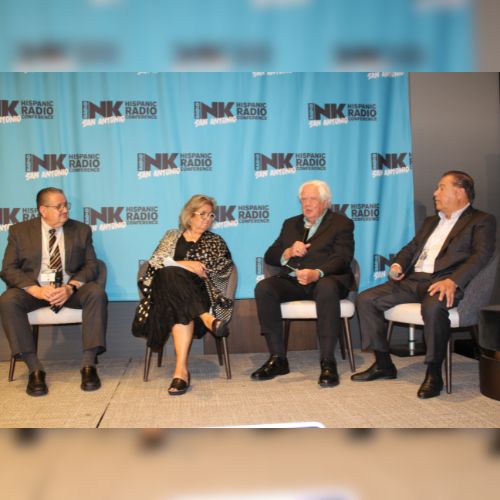By Cameron Coats
SAN ANTONIO — For anyone in broadcast media, it’s clear that the last 12 months have been filled with a wide variety of proposals and rule changes brought forth by the FCC as Congress continues to push for passage of the AM Radio for Every Vehicle Act.
How all of the action inside the Beltway may impact radio station owners targeting Latino consumers was at the heart of one Hispanic Radio Conference panel discussion.
A “Washington Update” saw veteran communications attorney Frank Montero, a Partner at Fletcher, Heald, & Hildreth; engage in conversation with Bryan Broadcasting VP/GM Ben Downs; Paula Maes, President of the New Mexico Broadcasters Association; SDC Broadcasting Co. President Matt Martinez; and Lazer Media President/CEO Alfredo Plascencia.
The first key issue discussed was the pending legislation on Capitol Hill that would mandate AM radio accessibility in all U.S. vehicles. Downs highlighted the significant lobbying efforts by the National Association of Broadcasters and state broadcasters’ associations, noting that while there have been some victories regarding AM radio’s inclusion in vehicles, the battle continues to ensure its sustained presence. The discussion also acknowledged the existential challenges radio faces if eliminated from the automobile, particularly with the rise of subscription models, favored by automakers for everything from heated seats to in-car entertainment.
The panelists then reviewed ongoing legal challenges related to Equal Employment Opportunity reporting requirements. As RBR+TVBR has reported, FCC recently voted to reinstate collection and reporting of Form 395-B, which the NAB has challenged. The rules now require broadcasters to disclose staff diversity data on race, ethnicity, and gender. This practice had been paused for two decades before its recent reinstatement, which includes a provision to release all data to the public. The NAB, along with other dissenters, believe this is a privacy concern and needs reexamination.
Indeed, the issue had been previously litigated in Texas on claims of infringements of First Amendment rights, contending that compulsory public disclosure of such data constitutes compelled speech that fails to meet the First Amendment’s strict scrutiny standard. Those concerns are being raised again in an ongoing lawsuit, along with the pending NAB petition for reconsideration with the FCC.
An evergreen issue that drew considerable attention and audience participation was the advertising of marijuana-related products. The panel clarified the legal nuances, noting that while medical marijuana might see a Schedule 3 reclassification, other products like Delta-8 remain tightly regulated. The advertising of ingestible CBD products is prohibited, equating the illegality of such promotions on radio with that of billboards, which also face stringent restrictions, despite out of home advertisers not having to answer to the Commission.
The panel also briefly touched on the implications of reinstating the Minority Tax Certificate, which has been proposed in Congress – a policy tool aimed at enhancing minority ownership in broadcasting, which could significantly impact Hispanic and other minority broadcasters.
Throughout the discussions, the importance of grassroots lobbying through state associations and individual stations was emphasized, underscoring the dynamic interplay between legislation, regulation, and media practices.





